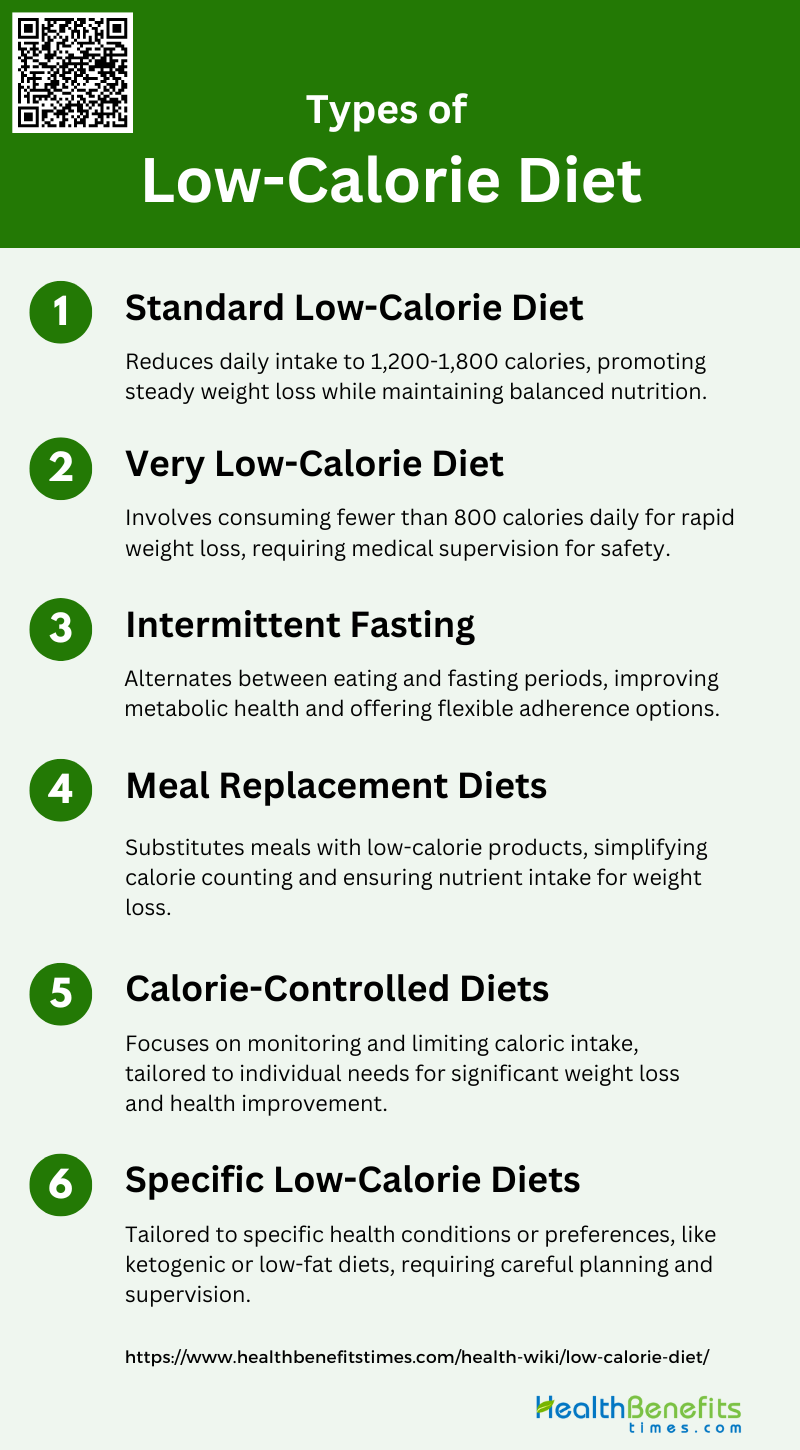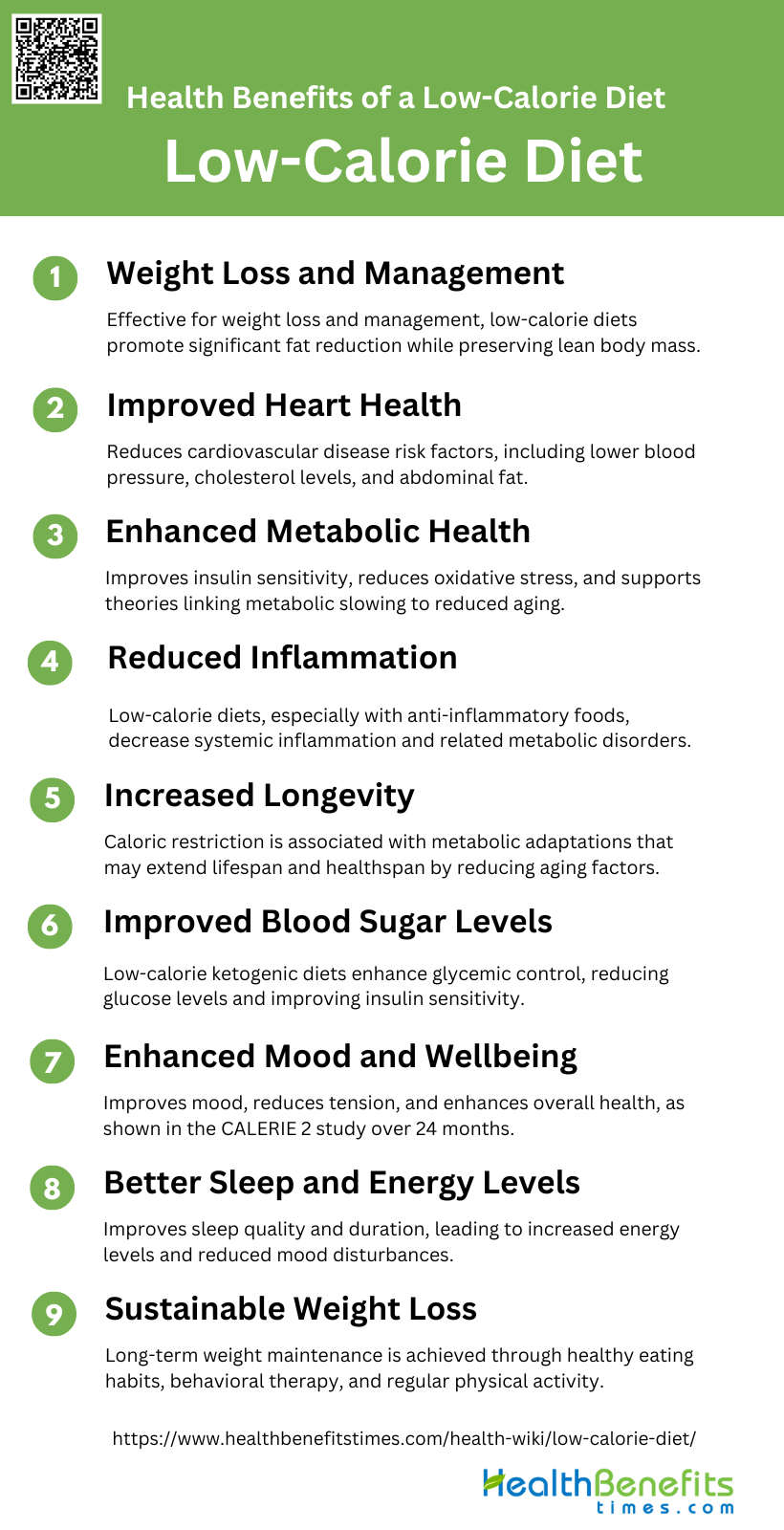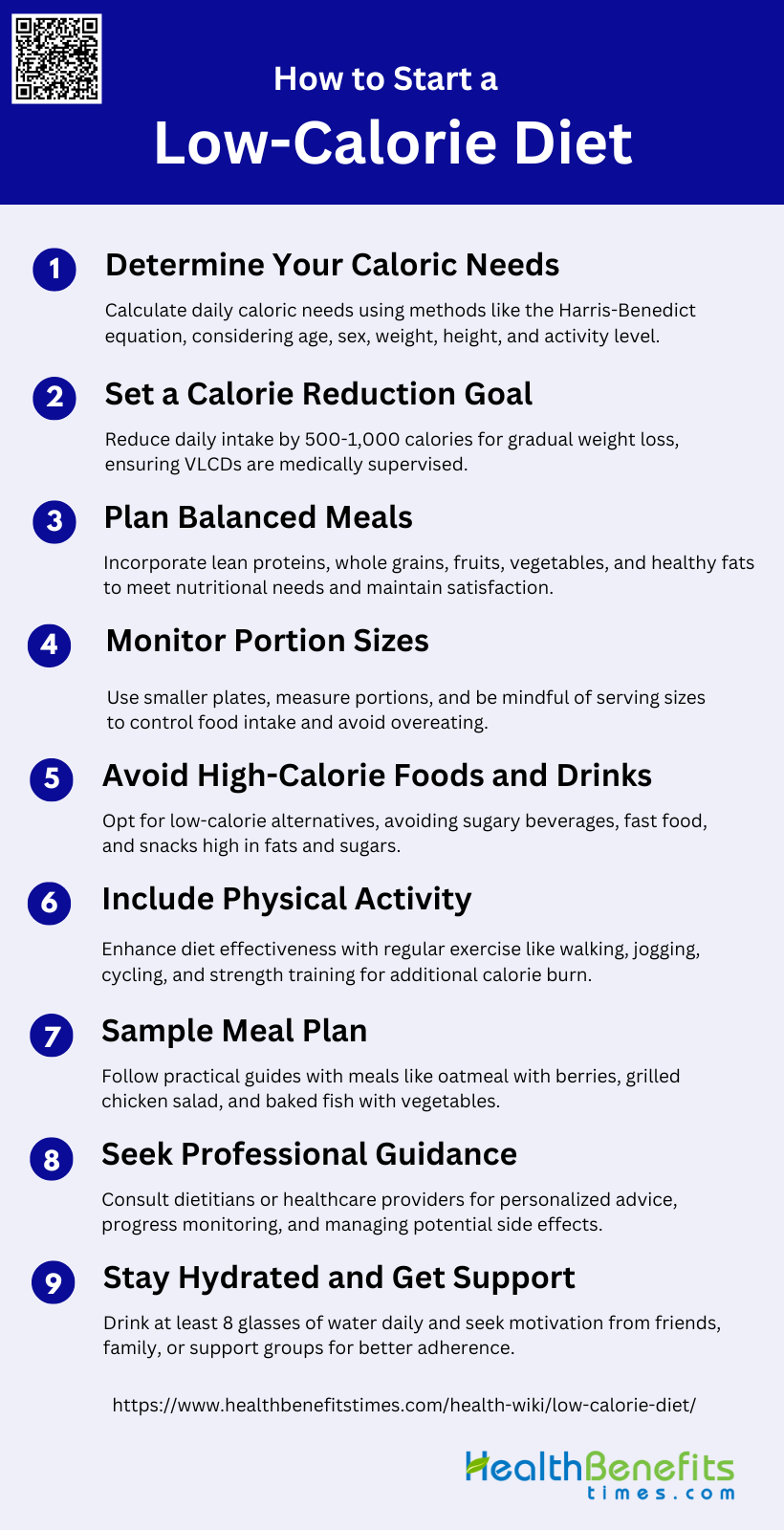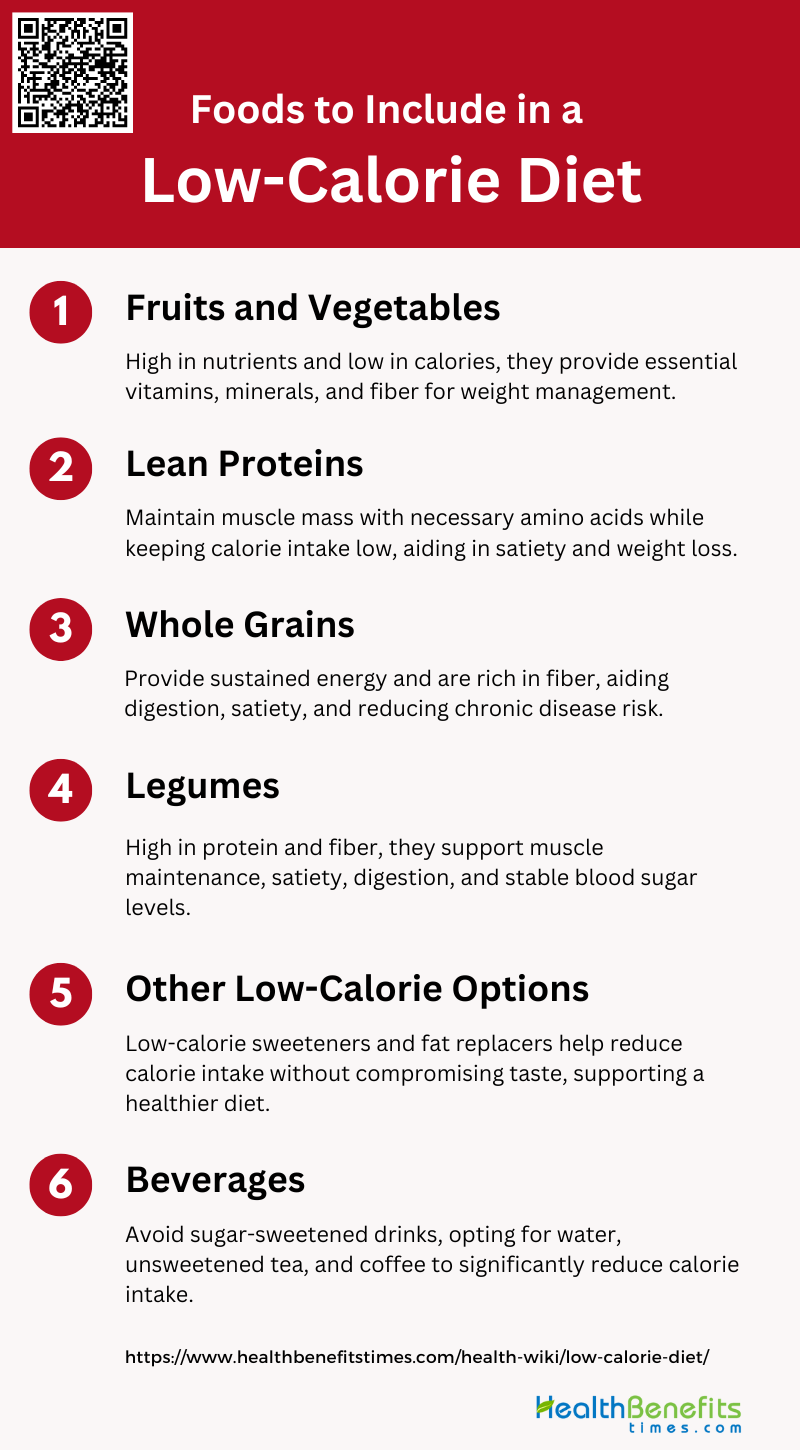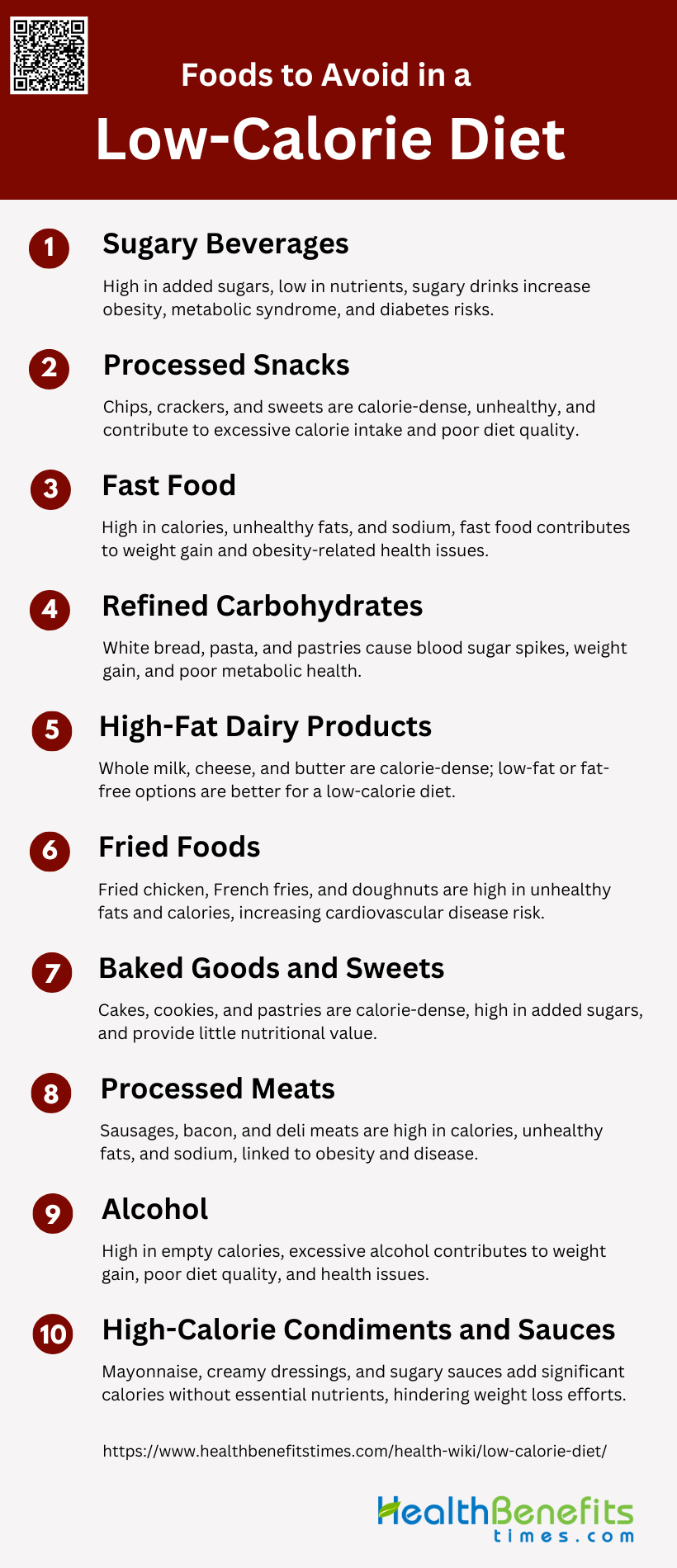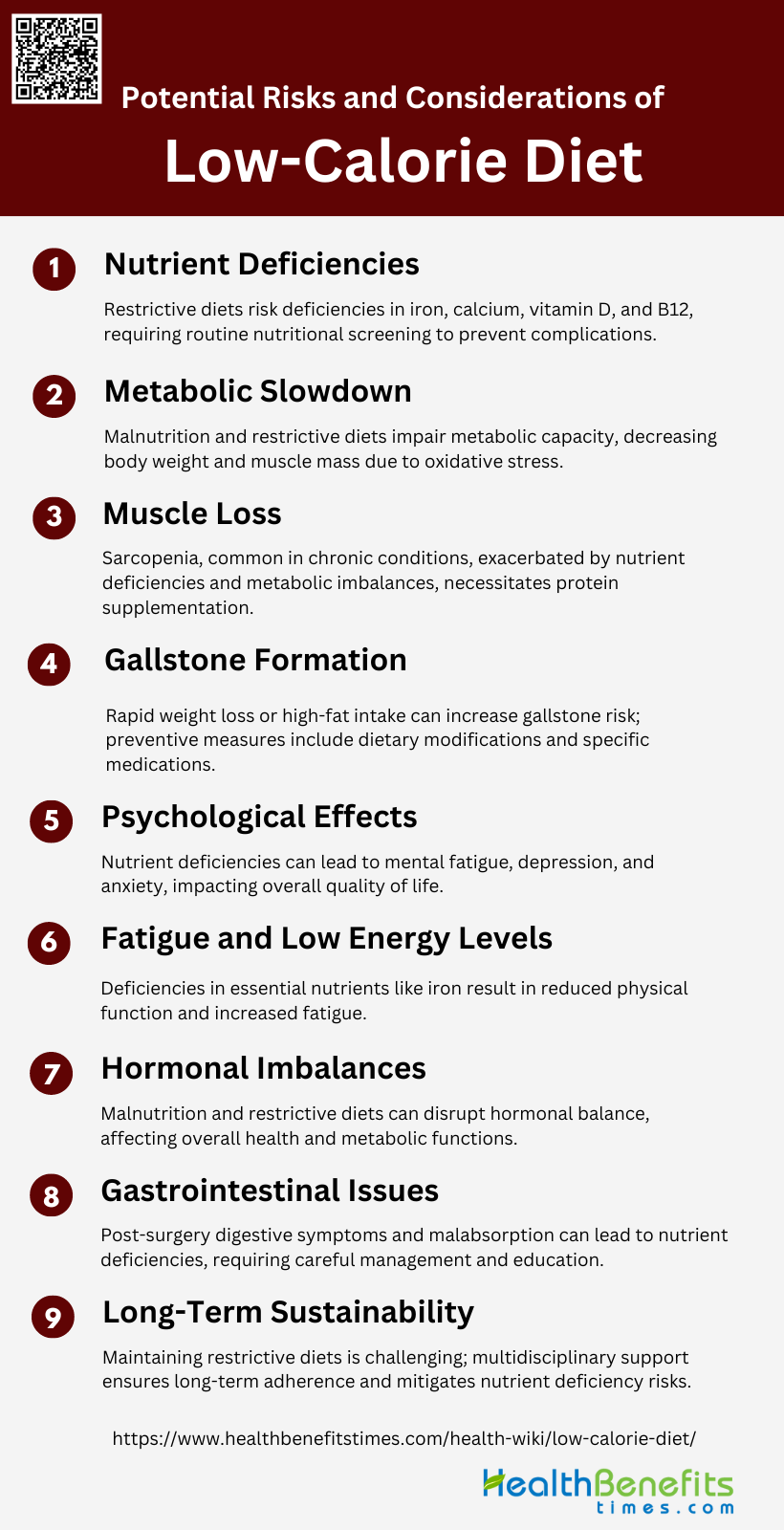A low-calorie diet is a nutritional plan that restricts daily caloric intake to promote weight loss or maintain a healthy weight. Typically, this diet involves consuming fewer calories than the body needs to maintain its current weight, often ranging between 1,200 to 1,500 calories per day for women and 1,500 to 1,800 calories per day for men, though these numbers can vary based on individual factors such as age, sex, and activity level. The focus is on nutrient-dense foods like fruits, vegetables, lean proteins, and whole grains while minimizing high-calorie, low-nutrient items such as sugary snacks, fried foods, and processed products. Adhering to a low-calorie diet can help reduce the risk of chronic diseases, improve metabolic health, and support overall well-being when done under proper guidance.
Types of low calorie diets
Low-calorie diets are designed to help individuals reduce their daily caloric intake to promote weight loss and improve overall health. These diets come in various forms, each with its unique approach to limiting calories while ensuring nutritional needs are met. Below are some common types of low-calorie diets:
1. Standard Low-Calorie Diet
A standard low-calorie diet (LCD) typically involves reducing daily caloric intake to about 1,200 to 1,800 calories per day. This approach is designed to create a caloric deficit, leading to gradual weight loss. Studies have shown that LCDs can be effective for weight management and improving metabolic health. For instance, a study comparing very-low-calorie diets (VLCDs) and LCDs found that while VLCDs may induce more rapid weight loss, LCDs are often more sustainable and easier to adhere to in the long term. LCDs are generally recommended for individuals looking to lose weight at a steady pace while maintaining a balanced diet.
2. Very Low-Calorie Diet (VLCD)
Very low-calorie diets (VLCDs) involve consuming fewer than 800 calories per day and are typically used for rapid weight loss in obese individuals. VLCDs have been shown to result in significant short-term weight loss and improvements in metabolic parameters such as glycemic control and lipid profiles. However, they require medical supervision due to potential risks such as nutrient deficiencies and loss of lean body mass. Studies have demonstrated that VLCDs can be particularly effective in managing obesity-related comorbidities, including type 2 diabetes, by improving insulin sensitivity and reducing HbA1c levels.
3. Intermittent Fasting
Intermittent fasting (IF) involves cycling between periods of eating and fasting. Various protocols exist, such as the 5:2 diet, where individuals consume a very low-calorie diet for two non-consecutive days per week and eat normally on the other days. Research indicates that intermittent VLCDs can improve glycemic control and cardiovascular risk factors in obese patients with type 2 diabetes. These diets offer flexibility and can be easier to adhere to compared to continuous caloric restriction. Studies have shown that intermittent fasting can lead to significant weight loss and improvements in metabolic health markers.
4. Meal Replacement Diets
Meal replacement diets involve substituting one or more meals with low-calorie, nutritionally balanced products such as shakes, bars, or soups. These diets are designed to simplify calorie counting and ensure nutrient intake while promoting weight loss. Research has shown that meal replacement diets can be effective for weight loss and improving metabolic health, particularly when combined with lifestyle interventions. They are often used as part of structured weight loss programs and can be a practical option for individuals seeking a convenient and controlled approach to dieting.
5. Calorie-Controlled Diets
Calorie-controlled diets focus on monitoring and limiting daily caloric intake to achieve weight loss or maintain a healthy weight. These diets can be tailored to individual needs and preferences, making them highly flexible. Studies have shown that calorie-controlled diets can lead to significant weight loss and improvements in metabolic health when adhered to consistently. The key to success with calorie-controlled diets is maintaining a balanced intake of macronutrients and micronutrients while creating a caloric deficit. This approach is often recommended for long-term weight management and overall health improvement.
6. Specific Low-Calorie Diets
Specific low-calorie diets are tailored to address particular health conditions or dietary preferences. Examples include low-carbohydrate ketogenic diets (VLCKDs) and low-fat diets. VLCKDs, which involve consuming fewer than 50 grams of carbohydrates per day, have been shown to be effective for rapid weight loss and improving metabolic health in individuals with obesity and type 2 diabetes. These diets can lead to significant reductions in body weight, waist circumference, and improvements in glycemic and lipid profiles. However, they require careful planning and medical supervision to ensure nutritional adequacy and manage potential side effects.
Health benefits of a Low Calorie Diet
Adopting a low-calorie diet can offer numerous health benefits, from weight loss to improved metabolic health. By reducing caloric intake, individuals can experience enhanced energy levels, better cardiovascular health, and a lower risk of chronic diseases. Here are some key health benefits of following a low-calorie diet:
1. Weight Loss and Management
Low-calorie diets (LCDs) are highly effective for weight loss and management. Studies have shown that very low-calorie diets (VLCDs) can lead to rapid weight loss, averaging 1.5 to 2.5 kg per week, with a total loss of around 20 kg over 12 to 16 weeks. This significant reduction in body weight is achieved by drastically reducing caloric intake, which forces the body to utilize stored fat for energy. Additionally, VLCDs have been found to preserve lean body mass while reducing fat mass, making them a viable option for effective weight management.
2. Improved Heart Health
Calorie restriction (CR) has been shown to significantly improve heart health by reducing risk factors associated with cardiovascular disease (CVD). A study involving a 25% CR over 24 months demonstrated reductions in blood pressure, total cholesterol, and LDL-cholesterol levels, as well as a 30% reduction in the 10-year risk of CVD. These improvements are attributed to the reduction in visceral and subcutaneous abdominal fat, which are key contributors to cardiovascular risk.
3. Enhanced Metabolic Health
CR has been linked to enhanced metabolic health, including improved insulin sensitivity and reduced oxidative stress. A study found that CR led to a significant decrease in the homeostasis model assessment of insulin resistance (HOMA-IR) during the weight loss phase, although this improvement was not maintained during weight maintenance. Additionally, CR was associated with reduced thyroid axis activity and lower production of reactive oxygen species, supporting theories that link metabolic slowing and reduced oxidative damage to aging.
4. Reduced Inflammation
Low-calorie diets can also reduce inflammation, which is a common issue in obesity and related metabolic disorders. A study comparing a nut-enriched low-calorie diet (NELCD) with a nut-free low-calorie diet (NFLCD) found that the NELCD group showed significant reductions in inflammatory markers such as intercellular adhesion molecule-1 (ICAM-1) and interleukin-6 (IL-6). This suggests that incorporating anti-inflammatory foods into a low-calorie diet can further enhance its benefits in reducing systemic inflammation.
5. Increased Longevity
CR has been associated with increased longevity in various species, and emerging evidence suggests similar benefits in humans. A study involving non-obese adults found that sustained CR led to metabolic adaptations that support the rate of living and oxidative damage theories of aging. These adaptations included reduced energy expenditure and lower oxidative stress, which are believed to contribute to increased lifespan. The findings indicate that CR can potentially extend healthspan and lifespan by mitigating factors that accelerate aging.
6. Improved Blood Sugar Levels
Low-calorie diets, particularly very low-calorie ketogenic diets (VLCKDs), have been shown to improve blood sugar levels and glycemic control. A study found that VLCKDs led to significant reductions in glucose levels and improved insulin sensitivity in obese individuals. These diets are effective in managing blood sugar levels by reducing carbohydrate intake, which in turn lowers the demand for insulin and helps stabilize blood glucose.
7. Enhanced Mood and Wellbeing
CR has positive effects on mood and overall wellbeing. The CALERIE 2 study found that participants on a 25% CR diet reported improved mood, reduced tension, and better general health compared to those on an ad libitum diet. These improvements were measured using standardized questionnaires and were consistent over the 24-month study period. The findings suggest that CR can enhance psychological wellbeing and quality of life.
8. Better Sleep and Energy Levels
Improved sleep quality and energy levels are additional benefits of a low-calorie diet. The CALERIE 2 study reported that participants on a CR diet experienced better sleep duration and quality compared to the control group. These improvements in sleep were associated with greater weight loss and reduced mood disturbances, indicating that CR can positively impact sleep patterns and overall energy levels.
9. Sustainable Weight Loss
While VLCDs are effective for rapid weight loss, long-term weight maintenance requires lifestyle changes. Studies have shown that incorporating behavioral therapy and physical activity into VLCD programs can improve long-term weight maintenance. Sustainable weight loss is achieved by adopting healthy eating habits and regular physical activity, which help prevent weight regain and promote overall health.
How to Start a Low Calorie Diet
Starting a low-calorie diet involves careful planning and a commitment to healthier eating habits. Begin by setting realistic goals, understanding your daily caloric needs, and choosing nutrient-dense foods. Here are some steps to help you get started on a low-calorie diet:
1. Determine Your Caloric Needs
To start a low-calorie diet, the first step is to determine your daily caloric needs. This can be done using various methods, such as the Harris-Benedict equation, which takes into account your age, sex, weight, height, and physical activity level. Understanding your caloric needs helps in setting a baseline for how many calories you should consume to maintain your current weight. From this baseline, you can then decide how much to reduce your caloric intake to achieve weight loss. Accurate determination of caloric needs is crucial for the effectiveness and safety of a low-calorie diet.
2. Set a Calorie Reduction Goal
Once you know your caloric needs, the next step is to set a realistic calorie reduction goal. A common recommendation is to reduce your daily intake by 500 to 1,000 calories, which can result in a weight loss of about 1 to 2 pounds per week. However, very low-calorie diets (VLCDs) that provide less than 800 calories per day should only be followed under medical supervision due to potential health risks. Setting a clear and achievable goal helps in maintaining motivation and tracking progress.
3. Plan Balanced Meals
Planning balanced meals is essential to ensure that you get all the necessary nutrients while on a low-calorie diet. Focus on incorporating a variety of foods, including lean proteins, whole grains, fruits, vegetables, and healthy fats. This not only helps in meeting your nutritional needs but also keeps you satisfied and reduces the likelihood of overeating. Studies have shown that balanced low-calorie diets can lead to significant weight loss and improvements in metabolic health.
4. Monitor Portion Sizes
Monitoring portion sizes is a key strategy in managing calorie intake. Using smaller plates, measuring food portions, and being mindful of serving sizes can help control the amount of food you consume. This practice is particularly important when eating out or consuming packaged foods, which often come in larger portions than necessary. Consistent portion control can significantly contribute to the success of a low-calorie diet.
5. Avoid High-Calorie Foods and Drinks
Avoiding high-calorie foods and drinks is crucial for maintaining a low-calorie diet. This includes sugary beverages, fast food, and snacks high in fats and sugars. Instead, opt for low-calorie alternatives such as water, herbal teas, and snacks like fruits and vegetables. Reducing the intake of high-calorie foods can help in achieving and maintaining weight loss, as well as improving overall health.
6. Include Physical Activity
Incorporating physical activity into your routine enhances the effectiveness of a low-calorie diet. Regular exercise helps burn additional calories, improves cardiovascular health, and boosts metabolism. Activities such as walking, jogging, cycling, and strength training are beneficial. Combining a low-calorie diet with physical activity has been shown to result in greater weight loss and better health outcomes compared to diet alone.
7. Sample Meal Plan
A sample meal plan can provide a practical guide for following a low-calorie diet. For example, a day might include a breakfast of oatmeal with berries, a lunch of grilled chicken salad with a variety of vegetables, a snack of a small apple, and a dinner of baked fish with steamed broccoli and quinoa. Such meal plans ensure a balanced intake of nutrients while keeping the calorie count low.
8. Seek Professional Guidance
Seeking professional guidance from a dietitian or healthcare provider is highly recommended when starting a low-calorie diet. Professionals can provide personalized advice, monitor your progress, and help manage any potential side effects. This is especially important for very low-calorie diets, which require careful supervision to avoid health complications.
9. Stay Hydrated and Get Support
Staying hydrated is essential for overall health and can aid in weight loss by helping you feel full. Aim to drink at least 8 glasses of water a day. Additionally, getting support from friends, family, or support groups can provide motivation and accountability. Sharing your goals and progress with others can make the journey more manageable and enjoyable.
Foods to Include in low-calorie diet
Incorporating the right foods into a low-calorie diet is essential for maintaining nutrition while reducing caloric intake. Focus on foods that are high in nutrients but low in calories to ensure you stay healthy and satisfied. Here are some foods to include in a low-calorie diet:
1. Fruits and Vegetables
Fruits and vegetables are essential components of a low-calorie diet due to their high nutrient density and low energy content. They provide essential vitamins, minerals, and fiber, which can help in weight management and overall health. Studies have shown that diets rich in fruits and vegetables can lead to significant weight loss and improved metabolic health. Additionally, the inclusion of these foods can help reduce the intake of high-fat and high-sugar foods, contributing to better diet quality. For example:
- Berries (strawberries, blueberries, raspberries)
- Watermelon, apples, grapefruit
- Leafy greens (spinach, kale, arugula)
- Broccoli, cauliflower, Brussels sprouts
- Cucumbers, celery, peppers
- Tomatoes, asparagus, zucchini
2. Lean Proteins
Lean proteins are crucial for maintaining muscle mass while on a low-calorie diet. They provide the necessary amino acids without the excess calories found in higher-fat protein sources. Research indicates that very-low-calorie ketogenic diets incorporating whey or vegetable protein are effective in promoting weight loss and improving metabolic parameters while maintaining muscle performance. Lean proteins also help in satiety, reducing overall calorie intake. Example includes:
- Chicken breast, turkey breast
- Fish (tuna, salmon, cod, flounder)
- Egg whites
- Greek yogurt, cottage cheese
- Tofu, tempeh
3. Whole Grains
Whole grains are an important part of a low-calorie diet as they provide sustained energy and are rich in fiber, which aids in digestion and satiety. Studies have shown that diets incorporating whole grains can lead to better weight management and reduced risk of chronic diseases. The fiber content in whole grains helps in maintaining a feeling of fullness, which can prevent overeating and support weight loss efforts. For examples:
- Oatmeal
- Brown rice, quinoa
- Whole grain bread/wraps (in moderation)
4. Legumes
Legumes are excellent low-calorie options that are high in protein and fiber. They can help in maintaining muscle mass and promoting satiety, which is beneficial for weight loss. Research has highlighted the role of legumes in improving metabolic health and supporting weight management. Their high fiber content also aids in digestion and helps in maintaining stable blood sugar levels, making them a valuable addition to a low-calorie diet. Example includes:
- Lentils
- Beans
- Chickpeas
- Peas
5. Other Low-Calorie Options
Other low-calorie options which can be part of an energy-restricted diet to alleviate metabolic syndrome, as well as low-calorie sweeteners and fat replacers that can help reduce overall calorie intake without compromising taste. The development of low-fat/calorie products with acceptable sensory characteristics has made it easier for consumers to maintain a healthier diet. For examples:
- Yogurt
- Air-popped popcorn
- Broth-based soups
- Salsa
6. Beverages
Choosing the right beverages is crucial in a low-calorie diet. Avoiding sugar-sweetened beverages can significantly reduce calorie intake and improve diet quality. Studies have shown that reducing the consumption of high-fat foods and sugar-sweetened beverages can lead to better weight management and overall health. Low-calorie soft drinks and other beverages with high-intensity sweeteners can provide a satisfying alternative to sugary drinks without the added calories. For example:
- Water
- Unsweetened tea and coffee
Foods to Avoid in a Low-Calorie Diet
When following a low-calorie diet, it’s important to avoid foods that are high in calories but low in nutritional value. These foods can hinder your weight loss goals and negatively impact your health. Here are some foods to avoid in a low-calorie diet:
1. Sugary Beverages
Sugary beverages, such as soft drinks and sweetened juices, are high in added sugars and provide little to no nutritional value. Consuming these beverages is associated with an increased risk of obesity, metabolic syndrome, and diabetes mellitus. Studies have shown that a greater intake of sugar-sweetened beverages is linked to a 44% increased prevalence of metabolic syndrome and a 26% increased risk of developing diabetes. Therefore, avoiding sugary beverages is crucial for maintaining a low-calorie diet and promoting overall health.
2. Processed Snacks
Processed snacks, including chips, crackers, and packaged sweets, are often high in calories, unhealthy fats, and added sugars. These snacks contribute to excessive calorie intake and poor dietary quality. Research indicates that individuals consuming a low-carbohydrate diet tend to avoid high-sugar, high-fat snacks, which are prevalent in typical Western diets. By eliminating processed snacks, one can reduce unnecessary calorie consumption and improve diet quality.
3. Fast Food
Fast food is typically high in calories, unhealthy fats, and sodium, making it detrimental to a low-calorie diet. Frequent consumption of fast food is associated with weight gain and an increased risk of obesity and related health issues. Studies have shown that low-carbohydrate diets, which often exclude fast food, are associated with beneficial dietary changes, including higher consumption of nutrient-dense foods like nuts, seeds, and oily fish. Avoiding fast food can help maintain a healthier, lower-calorie diet.
4. Refined Carbohydrates
Refined carbohydrates, such as white bread, pasta, and pastries, are quickly digested and can lead to spikes in blood sugar levels. These foods are low in fiber and essential nutrients, contributing to weight gain and poor metabolic health. Research suggests that reducing the intake of refined grains, starches, and added sugars is crucial for individuals with metabolic disorders. Opting for whole grains and high-fiber carbohydrates can support a low-calorie diet and improve health outcomes.
5. High-Fat Dairy Products
High-fat dairy products, including whole milk, cheese, and butter, are calorie-dense and can contribute to excessive calorie intake. While dairy can be part of a healthy diet, choosing low-fat or fat-free options can help reduce calorie consumption. Studies have shown that consumers of low-calorie sweeteners tend to have better dietary quality, including higher consumption of low-fat dairy products. Therefore, avoiding high-fat dairy can support a low-calorie diet.
6. Fried Foods
Fried foods, such as fried chicken, French fries, and doughnuts, are high in unhealthy fats and calories. These foods can contribute to weight gain and increase the risk of cardiovascular disease. Research indicates that low-carbohydrate diets, which often exclude fried foods, are associated with lower consumption of high-fat snacks and better overall dietary quality. Avoiding fried foods is essential for maintaining a low-calorie diet and promoting heart health.
7. Baked Goods and Sweets
Baked goods and sweets, including cakes, cookies, and pastries, are high in added sugars and unhealthy fats. These foods are calorie-dense and provide little nutritional value, making them detrimental to a low-calorie diet. Studies have shown that reducing the intake of added sugars is crucial for weight management and metabolic health. By avoiding baked goods and sweets, one can reduce unnecessary calorie intake and improve diet quality.
8. Processed Meats
Processed meats, such as sausages, bacon, and deli meats, are high in calories, unhealthy fats, and sodium. These foods are associated with an increased risk of obesity, cardiovascular disease, and certain cancers. Research suggests that low-carbohydrate diets, which often exclude processed meats, are associated with better dietary quality and lower consumption of unhealthy foods. Avoiding processed meats can support a low-calorie diet and improve overall health.
9. Alcohol
Alcoholic beverages are high in empty calories and can contribute to weight gain and poor dietary quality. Excessive alcohol consumption is associated with an increased risk of obesity, liver disease, and other health issues. Studies have shown that consumers of low-calorie sweeteners tend to have lower alcohol consumption and better overall dietary quality. Reducing or eliminating alcohol intake can help maintain a low-calorie diet and promote better health outcomes.
10. High-Calorie Condiments and Sauces
High-calorie condiments and sauces, such as mayonnaise, creamy dressings, and sugary sauces, can add significant calories to meals without providing essential nutrients. These additions can contribute to excessive calorie intake and weight gain. Research indicates that low-carbohydrate diets, which often exclude high-calorie condiments, are associated with better dietary quality and lower calorie consumption. Opting for low-calorie alternatives or using condiments sparingly can support a low-calorie diet.
Tips for Success on a Low-Calorie Diet
Achieving success on a low-calorie diet requires dedication, planning, and mindful eating habits. By incorporating practical strategies and staying consistent, you can effectively manage your caloric intake and reach your health goals. Here are some tips for success on a low-calorie diet:
- Set a reasonable calorie deficit: Establishing a moderate calorie deficit is crucial for sustainable weight loss. Extreme calorie restriction can lead to muscle loss and nutritional deficiencies, making it harder to maintain weight loss long-term.
- Prioritize protein: Consuming adequate protein helps preserve muscle mass during weight loss. Studies suggest incorporating protein-rich foods like lean meats, dairy, and legumes to support metabolic health and satiety.
- Fill up on fruits and vegetables: Fruits and vegetables are low in calories but high in fiber, vitamins, and minerals. They help you feel full and satisfied, making it easier to stick to a low-calorie diet.
- Stay hydrated: Drinking plenty of water can aid in weight loss by promoting satiety and reducing calorie intake. Staying hydrated also supports overall health and metabolic functions.
- Plan and prepare meals ahead of time: Meal planning and preparation can help you control portion sizes and make healthier food choices. It reduces the temptation to opt for high-calorie convenience foods.
- Practice portion control: Monitoring portion sizes is essential to avoid overeating. Using smaller plates and measuring servings can help you stay within your calorie limits.
- Eat regular, balanced meals: Consuming regular, balanced meals helps maintain energy levels and prevents overeating. Include a mix of protein, healthy fats, and carbohydrates in each meal.
- Track your food intake: Keeping a food diary or using a tracking app can help you stay accountable and make more informed food choices. It allows you to monitor your calorie intake and nutritional balance.
- Get enough sleep: Adequate sleep is vital for weight loss and overall health. Poor sleep can disrupt hormones that regulate hunger and appetite, leading to weight gain.
- Include physical activity: Regular physical activity enhances weight loss and helps maintain muscle mass. Combining aerobic exercises with strength training is particularly effective.
- Allow occasional treats in moderation: Incorporating occasional treats can make a low-calorie diet more sustainable. Moderation is key to preventing feelings of deprivation and maintaining long-term adherence.
Potential Risks and Considerations
While a low-calorie diet can offer numerous health benefits, it is important to be aware of potential risks and considerations. Rapid weight loss, nutrient deficiencies, and decreased energy levels are some concerns that may arise. Here are some potential risks and considerations to keep in mind:
1. Nutrient Deficiencies
Nutrient deficiencies are a significant risk following dietary restrictions or surgical interventions like bariatric surgery. These deficiencies can include iron, calcium, vitamin D, and vitamin B12, which are crucial for various bodily functions. For instance, iron deficiency can lead to reduced skeletal muscle function and muscle mass, causing sarcopenia. Long-term follow-up and routine nutritional screening are essential to prevent serious complications such as encephalopathy or protein-energy malnutrition.
2. Metabolic Slowdown
Metabolic slowdown is a common consequence of malnutrition and restrictive diets. Studies have shown that malnutrition impairs metabolic capacity in both fast and slow skeletal muscles, leading to decreased body weight and muscle mass. This metabolic impairment is often due to increased oxidative stress and decreased expression of key mitochondrial enzymes, which are essential for energy production.
3. Muscle Loss
Muscle loss, or sarcopenia, is a frequent complication in conditions like chronic kidney disease (CKD) and cirrhosis. It is often exacerbated by nutrient deficiencies, metabolic acidosis, and hormonal imbalances. Nutritional strategies, including protein supplementation and amino acid intake, are crucial to counteract muscle wasting, although they are not always effective due to underlying metabolic abnormalities.
4. Gallstone Formation
Dietary changes, especially those involving rapid weight loss or high-fat intake, can increase the risk of gallstone formation. Diets high in refined sugars, low fiber, and low vitamin C intake are particularly associated with this risk. Preventive measures include the use of ursodeoxycholic acid during the first six months post-surgery and dietary modifications to include protective nutrients like monounsaturated fats and fiber.
5. Psychological Effects
Psychological effects such as mental fatigue, depression, and anxiety can result from nutrient deficiencies and metabolic imbalances. Vitamins and minerals like B vitamins, iron, and magnesium play critical roles in cognitive and psychological functions. Deficiencies in these nutrients can lead to mental and physical fatigue, impacting overall quality of life. Long-term compliance with nutritional guidelines is essential to mitigate these effects.
6. Fatigue and Low Energy Levels
Fatigue and low energy levels are common symptoms of nutrient deficiencies and metabolic slowdown. Iron deficiency, for example, impacts cellular respiration and mitochondrial energy metabolism, leading to reduced physical function and increased fatigue. Adequate intake of vitamins and minerals is crucial to support energy-yielding metabolism and prevent these symptoms.
7. Hormonal Imbalances
Hormonal imbalances can result from malnutrition and restrictive diets, affecting overall health and metabolic functions. In CKD patients, hormonal imbalances contribute to muscle wasting and protein-energy wasting (PEW). Nutritional therapy, including adequate protein and energy intake, is essential to manage these imbalances and improve patient outcomes.
8. Gastrointestinal Issues
Gastrointestinal issues such as digestive symptoms, food intolerance, and malabsorptive complications are common after bariatric surgery. These issues can lead to nutrient deficiencies and require careful monitoring and management. Pre- and postoperative therapeutic patient education (TPE) programs can help increase long-term compliance and mitigate these gastrointestinal complications.
9. Long-Term Sustainability
Long-term sustainability of restrictive diets and nutritional interventions is often challenging. Poor compliance with dietary guidelines can lead to recurrent nutrient deficiencies and associated complications. Multidisciplinary approaches involving dietitians, mental health professionals, and regular follow-ups are essential to ensure long-term adherence and improve patient outcomes.



